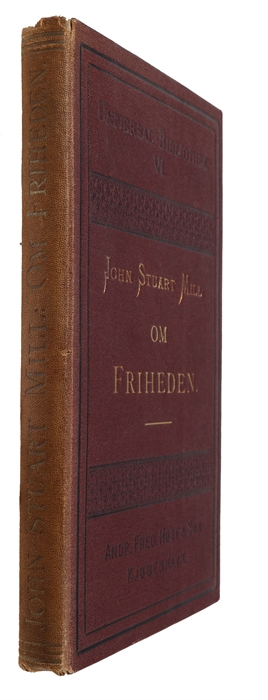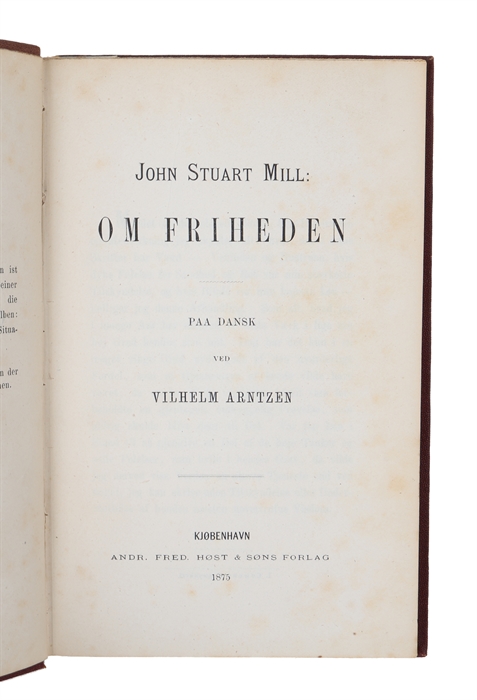FIRST DANISH EDITION OF THE CHIEF MANIFESTO OF LIBERALISM
MILL, JOHN STUART.
Om Friheden. Paa dansk ved Vilhelm Arntzen.
Kjøbenhavn (Copenhagen), Høst & Søn, 1875.
8vo. Original burgundy full cloth with gilt lettering to spine. Gilt title and black lettering and ornamentation to front board. Spne sunned and capitals worn. Otherwise a very nice copy with sharpt edges and very fresh boards. Some brownspotting, especially to first and last leaves. Pencil-underlinings and -annotations. (8), 208 pp.
Scarce first Danish edition of Mill's radical and enormously influential work on liberty, which "remains his most widely read book. It represents the final stage in the growth of Utilitarian doctrine, and its central point is one which had escaped both Mill's father and Bentham." (PMM 345). The work became etremely influential throughout all of Europe, and Mill's Utilitarian ideas also found great resonace in Scandinavia. In Denmark, great authorities such as Høffding and Brandes were deeply influenced by the ideas of Liberty and Utilitarianism.
"On Liberty" constitutes one of the most important documents of political liberalism. The ideas presented in this hugely influential work have remained the basis of much liberal political thought ever since its appearance, and the work has remained in print continuously ever since its initial publication. To this day, a copy of On Liberty has been passed to the president of the British Liberals, and then Liberal Democrats, as a symbol of office and succession from the party that Mill helped found.
In "On Liberty" Mill famously supports the individual's sovereignty over himself and presents the basis for liberty. It is here that one of the most fundamental statements of liberal thought is presented for the first time, namely "over himself, over his own body and mind, the individual is sovereign". "On Liberty" constitutes a defense of the rights of the individual against the state, a justification of the freedom of the individual in opposition to what Mill calls the "tyranny of the majority". It is also in this work that the famous "Harm principle", or the principle of liberty, which stands at the very core of all liberal thought, is presented for the first time.
"In "On Liberty" (1859) Mill defended the importance of individual freedom of thought and action, arguing that the individual is the best judge of his or her own good and that society benefits from the experimentation that occurs in an atmosphere of liberty." (" International Encyclopedia of the Social Sciences". Ed. William A. Darity, Jr.. Vol. 8. 2nd ed., 2008. p 553).
"Mill realized that the "greatest good" of the community is inseparable from the liberty of the individual. Hitherto, liberty had always been considered relative, in relation to tyranny or oppression: Mill extended tyranny to include a custom-ridden majority, and declared that "the sole end for which mankind is justified in interfering with liberty of action is self-protection". [...] His arguments for freedom of every kind through speech have never been improved on. He was the first to recognize the tendency of a democratically elected majority to tyrannize over a minority, and his warning against it has a contemporary ring: "We can never be sure that the opinion we are endeavouring to stifle is a false opinion; and, if we were sure, stifling it would be an evil still"." (PMM 345).
"Mill's son was to prove Britain's preeminent, or at least most famous, political philosopher of the nineteenth century, less for his writings on utilitarianism than for his System of Logic and his essay On Liberty, still today liberalism's chief manifesto." (Robert Wokler, in: "Europe 1789-1914: Encyclopedia of the Age of Industry and Empire". Ed. John Merriman and Jay Winter. Vol. 5. 2006. p. 2393).
Order-nr.: 62630



